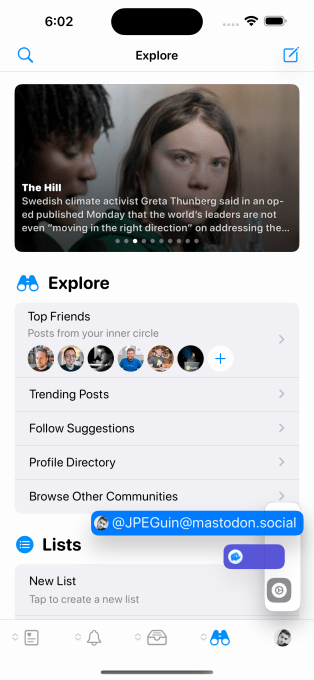Mammoth, a recently launched Mastodon app that’s trying to make it easier on users who want to join the decentralized social web, has a notable financial backer. The company confirmed that its leading pre-seed investor is Mozilla, a proponent of the open web, who invested in the company’s first general round alongside others, including Long Journey Ventures and Salesforce’s Marc Benioff.
The company has a unique founding story as well. The app was originally built by iOS developer Shihab Mehboob, the creator behind a number of apps including the whimsical music app Vinyls and the Twitter client Aviary 2. The latter was impacted by Elon Musk’s Twitter API changes which put an end to third-party Twitter clients, prompting Mehboob to turn his attention to the decentralized and open source Twitter alternative Mastodon.
Mammoth was the result of those efforts, but it has since been acquired by the company that’s now running the project, led by principal developer Bart Decrem.
Now, the team at Mammoth is just three full-time employees and a handful of contractors. And while the total investment round is undisclosed, Decrem characterized the pre-seed as a small amount — “a million or two is the general round” at this stage, he says.
The new Mammoth founder’s background is both in open source and consumer apps, in addition to entrepreneurship.
In ’99, Decrem worked on a Linux startup called Eazel which aimed to make Linux easier to use. While others on that project later ended up building Safari and other technology at Apple, Decrem found himself at the Mozilla Foundation ahead of the Firefox 1.0 launch. There, he ran marketing and business affairs and worked on branding and the international launch. He was also a part of the search monetization discussions, including the initial Google search deal.
He later went on to more entrepreneurial efforts including the VC-backed social web browser Flock (which received its fair share of TechCrunch coverage back in the day), followed by an early smartphone game maker Tapulous, makers of Tap Tap Revenge. The latter landed him at Disney following an acquisition, as the head of the mobile games group, which put out products like the “Where’s My Water” series and some “Temple Run” titles.
Some of these prior efforts had also involved the same approach of finding and partnering with existing developers, Decrem notes, including the original Tap Tap Revenge developer. Later at Disney, he found a developer in QA who had built a No. 1 game on the App Store, but not under Disney’s branding. Decrem brought the developer into his group and gave him the space to create what became “Where’s My Water?,” a title that’s seen a billion-some downloads by now.
“The way I like to do things is you find somebody special and then get out the way and support their vision,” Decrem explains. “I saw that spark in [Mammoth founder] Shihab [Mehboob], and that’s why we’re working together.”
The two were teamed up as Decrem was running a small lab that had been working on decentralization projects, including a crypto app called KyrptoSign, for legal documents on the blockchain, as well as an art collective. But when Mastodon came along, the team pivoted, acquired Mammoth and now it’s the group’s only focus.

Image Credits: Mammoth
For Decrem, the appeal of Mastodon was not just that it’s an open source Twitter clone — something he said only felt “mildly interesting” — but how it was a place where communities were forming.
“It reminded me of Firefox 0.7, which is what I got involved in Mozilla — the Firefox launch,” Decrem says. “I was like, there’s just people nerding out here, doing cool shit…that feels exciting and interesting and everything I like about the internet — communities building and organizing themselves.”
“This thing is half microblogging, but half people organizing communities — like Reddit, or maybe like Discord,” he continues. “This is like a digitally native social system. And it’s decentralized. That’s freaking cool.”
Other companies seem to think it’s cool too. Today, Flipboard announced it was joining the decentralized social web. Medium already has, and Tumblr said it would.
The challenge, of course, for Mammoth, will be not just making the decentralized social web more appealing to more newcomers but also successfully maintaining and generating revenue from the app itself. Decrem says the company plans to have a subscription plan available in a few months that will range from $3-5 per month, at least half of which will likely go toward its server bills.
But revenue is not the immediate focus — growing its user base comes first. As for now, Mammoth has at least a year’s worth of funding thanks to Mozilla’s backing, Decrem says. And they’re willing to be patient, he notes.
Mozilla leads Mastodon app Mammoth’s pre-seed funding by Sarah Perez originally published on TechCrunch
from TechCrunch https://ift.tt/vFcPwDz
via Technology
Comments
Post a Comment